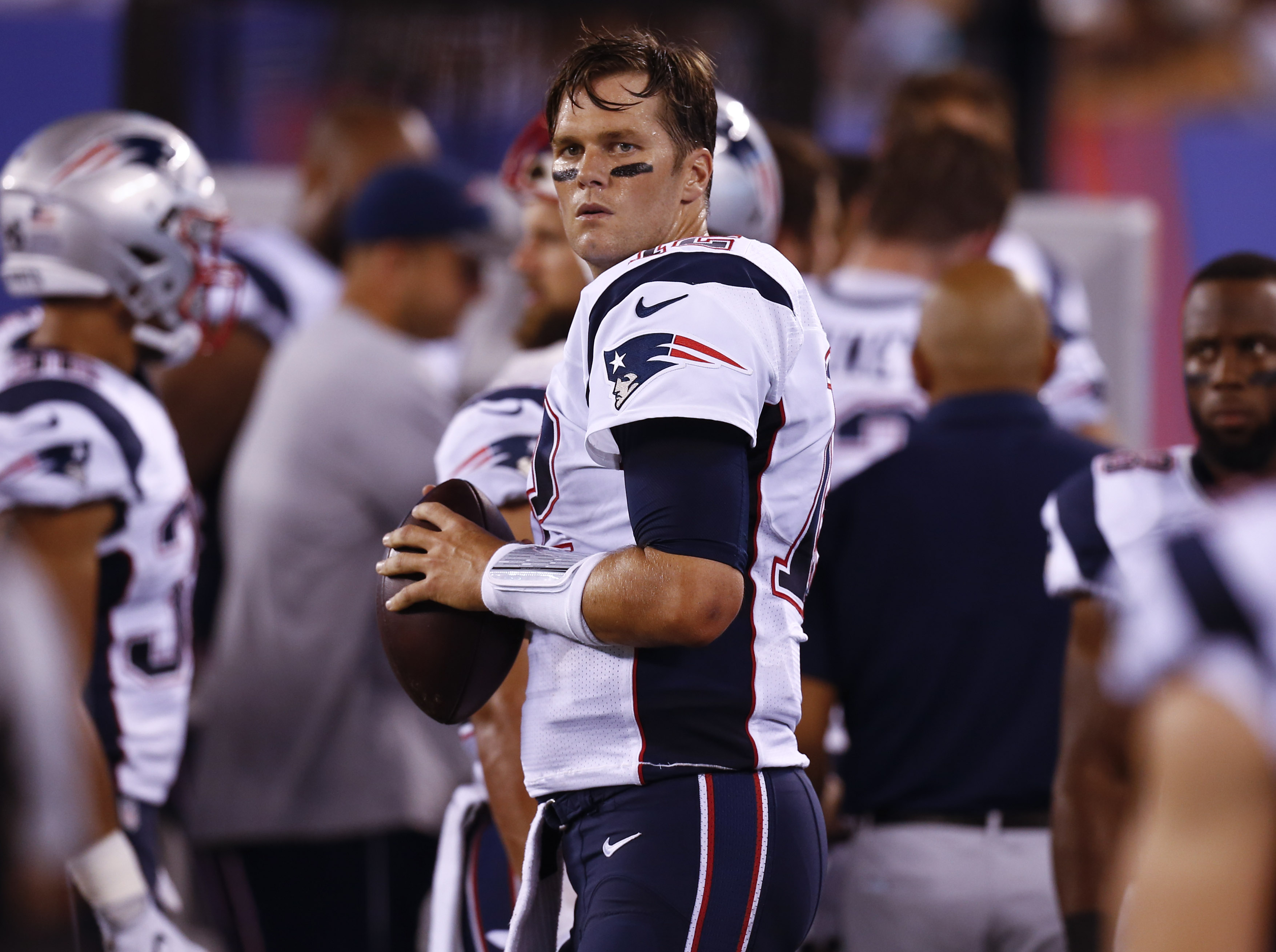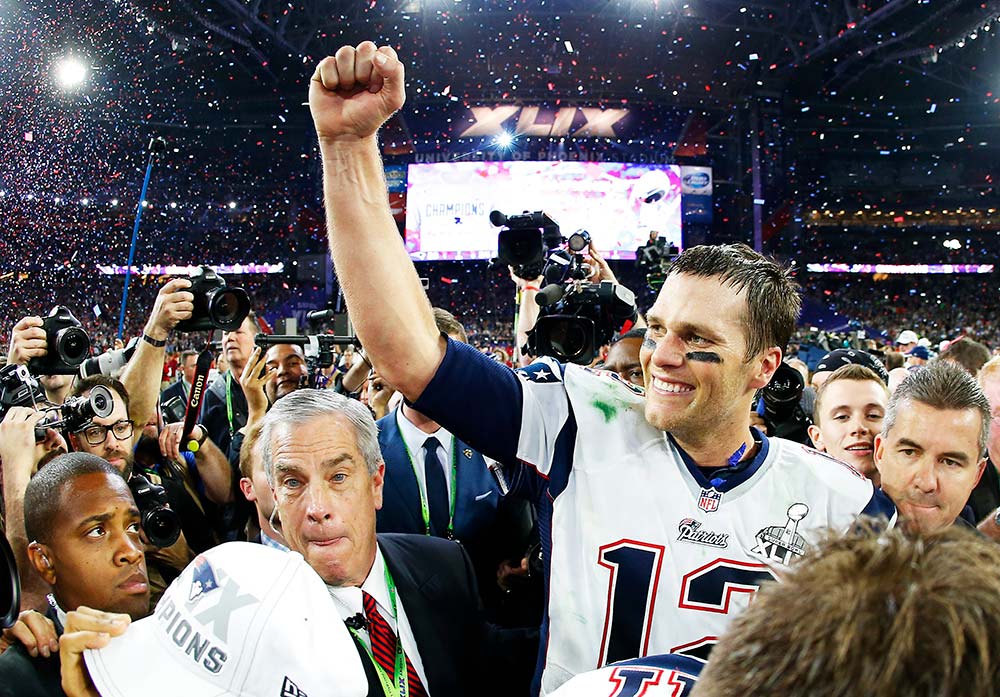Like any seasoned sports executive who owns and operates a major franchise, Jeanie Buss approaches the annual draft with strong ideas of what her team wants—and definitely does not want. Throughout her decades with the Los Angeles Lakers, she has seen the highs of landing studs (from Magic Johnson to James Worthy to Kobe Bryant) and the lows of bombing (Earl Jones, anyone?). She can tell you myriad stories about character, about work ethic, about the impact one small piece can have on the future path of an organization.
She does not merely gauge prospects by statistics or measurements. No, when Buss considers adding someone to her team, no character traits are taken for granted.
Which is why, as the decadelong owner of Team United of both the Die Hard Fantasy Football League and the Grid Iron Girls Fantasy Football League, Buss has steadfastly refused to draft Tom Brady.
“It’s nothing personal,” she says. “I just find him annoying.”

Tom Brady warms up on the sidelines during a preseason game against the New York Giants at MetLife Stadium on September 1, 2016.
Buss, on the phone from Los Angeles, chuckles with those words because she realizes how bonkers they sound. I ask, casually, if there are others she would not allow to wear the nonexistent helmet and uniform of Team United.
“Well, I won’t draft Ben Roethlisberger,” she says, citing his history of alleged sexual assault. “I’d rather lose without him than win with him. And I won’t take anyone who plays for the Washington NFL team because I don’t want to say the name. That organization needs to change…”
There is a pause. Buss is one of the NBA’s best talkers, a media godsend who rarely pulls punches or dodges inquiries. She’s smart, forthright and engaging. Yet here, with this topic, she is struggling. Roethlisberger’s history is easily viewed. Washington’s history is also well-documented. But what, exactly, does she have against the New England quarterback?
Hmm…
“You…ah…it’s…um…um…it’s probably…eh…well, I don’t know,” she says. “Maybe it’s a holdover from my dislike of the Celtics from the Larry Bird time. Or…mmm…um…I don’t know what it is. He’s just too successful, too smug, too much of a winner.”
Another pause.
“Honestly,” she says, “I’m sort of ashamed to admit it. Because he’s probably a nice guy. But I hate Tom Brady.”

Tom Brady celebrates after defeating the Seattle Seahawks 28-24 during Super Bowl XLIX at University of Phoenix Stadium on February 1, 2015 in Glendale, Arizona. (Getty Images)
With those words, Buss laughs and laughs and laughs. Beneath the lightness of the sentiment, however, is a confounding truth: People hate Tom Brady. They hate his smile, his giggle, his chin dimple, his walk, his talk. They hate that he’s rich and successful. They hate that he’s tall and handsome. They hate that he’s married to a famous model. They hate that he dresses out of a J. Crew catalogue. They hate that, like a Ken doll, he’s gone through 124 hairstyles (Skater Tom Brady. Surfer Tom Brady. Preppy Tom Brady. Lumberjack Tom Brady). They hate that he has won four Super Bowls. They hate that his coach is a brooding rumpled sweatshirt and that the red cap in Brady’s locker reads (or did for a brief spell) MAKE AMERICA GREAT AGAIN.
They consider him to be a cheater, a liar, a symbol of all that’s bad in professional football. A recent (and admittedly unscientific) Sporting News ranking of the 40 all-time most hated players had Brady fifth—behind Greg Hardy, Ndamukong Suh, Terrell Owens and Michael Vick—all of whom have more obvious reasons to be higher on the list than Brady.
In other words, people really, really, really, really, really, really, really hate Tom Brady.
But why?
✦ ✦ ✦
There is a strange thing we do in America, and while the phenomenon has repeatedly been explained away with peppy-yet-cliched responses, a legitimate reasoning seems hard to come by.
Namely: What’s the deal with our irrational loathing of professional athletes?
If one considers it from a base level, the whole thing makes little sense. These are not (generally) people who have committed murder, or embezzlement, or armed robbery. They have not made your dough vanish in some Ponzi scheme, or insulted your mother’s breath on social media, or spit in your pumpkin spice latte, or clogged your toilet.
No, a professional athlete is merely a man or woman with advanced physical skills who performs on a high level while wearing glorified pajamas. He or she is paid a substantial amount of money to utilize those talents in front of large crowds in a region that (with rare exception) has little connection to their upbringing or development.
Babe Ruth, the legendary Yankee, was a kid from Baltimore. Walter Payton, one of the greatest running backs in NFL history, starred for the Chicago Bears via Columbia, Mississippi. Blake Griffin is in Los Angeles by way of Oklahoma City, and Russell Wilson, Seattle’s favorite son, is straight out of Cincinnati.
Tom Brady, New England Patriot, was born and raised in San Mateo, California. He is as Boston as a pulled pork sandwich.
"I’m sort of ashamed to admit it. Because he’s probably a nice guy. But I hate Tom Brady."
— JEANIE BUSS
“And that’s what makes it all confusing,” says Brian Levin, the director of the Center for the Study of Hate and Extremism at Cal State San Bernardino. “Logically, even if we can’t stand the Patriots, why would we hate a person from California playing football for a team in New England? He’s not even from there. It wasn’t his choice to go there. But hate isn’t logical. It’s emotional, and it revolves around emotion and symbols. If you hate a certain team, you hate the symbol of that team. And the symbol is usually the star player.”
Levin doesn’t stop there. Anointing detestation upon a professional athlete usually means making a (sometimes conscious, sometimes subconscious) decision to irrationally assign character traits that have nothing to do with the sport itself. One decides the target of angst is a bad person, a liar, a jerk, a fraud.
“We see a man in his 50s drive by in a Ferrari, and our first thought is, ‘Look at that douche going through his midlife crisis,” says Mike Cernovich, author of Gorilla Mindset, a self-help book that helps people control their emotions. “Well, maybe he was a poor kid who worked hard his whole life and can finally afford his dream vehicle. But we don’t want to see that. We want to think of every reason to bring someone down to our level.
“I’m not a big sports guy. But with Tom Brady, it seems like people have come up with a lot of reasons.”
Indeed.






